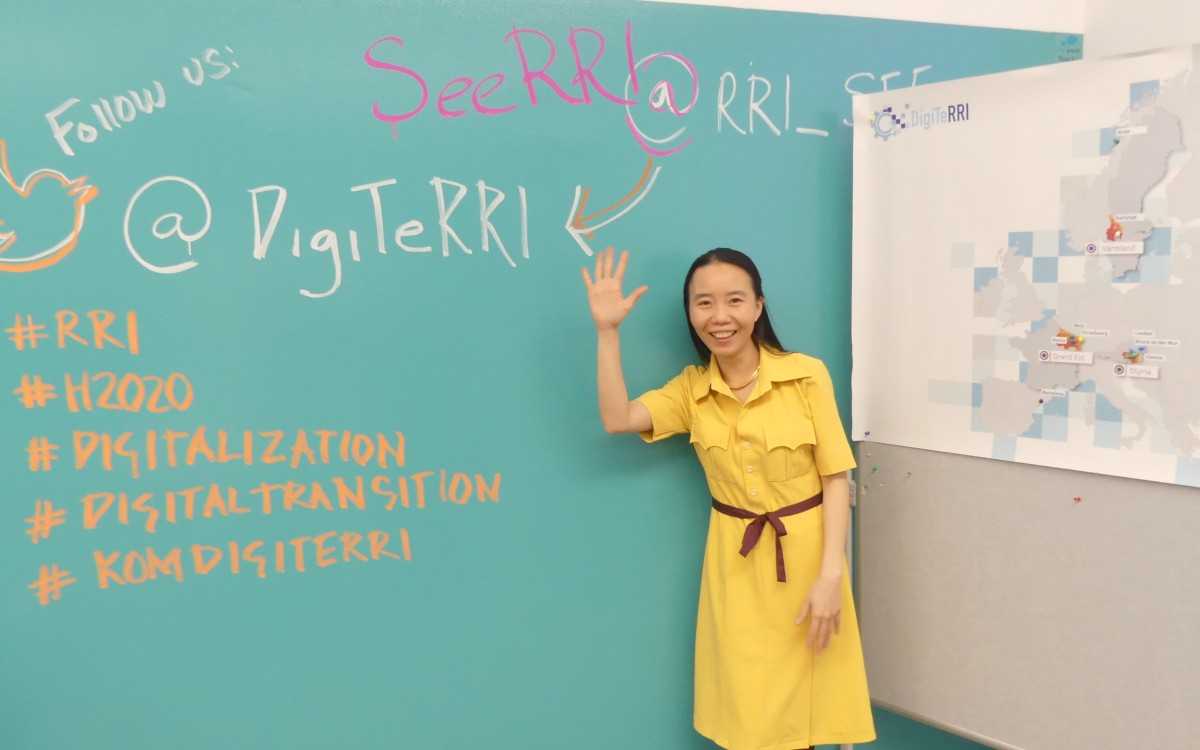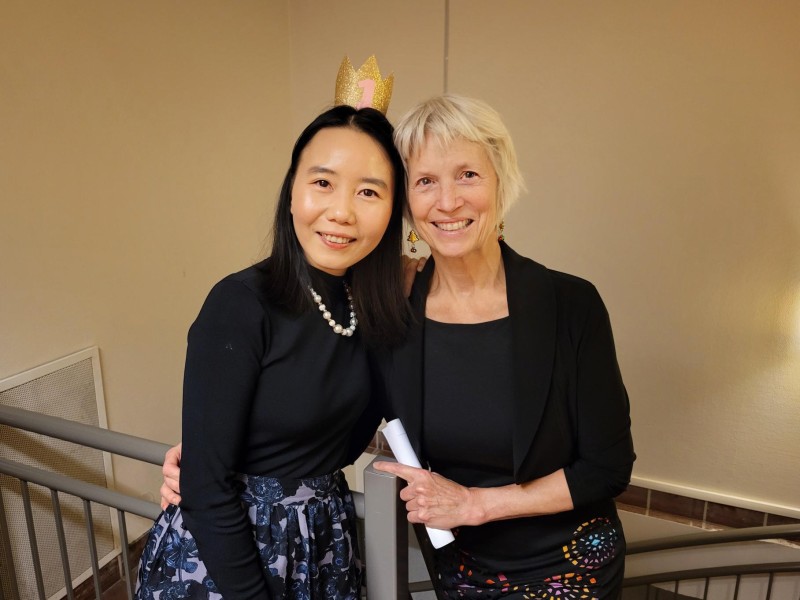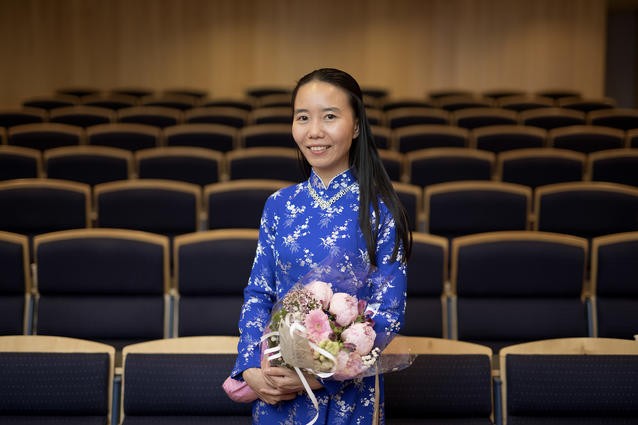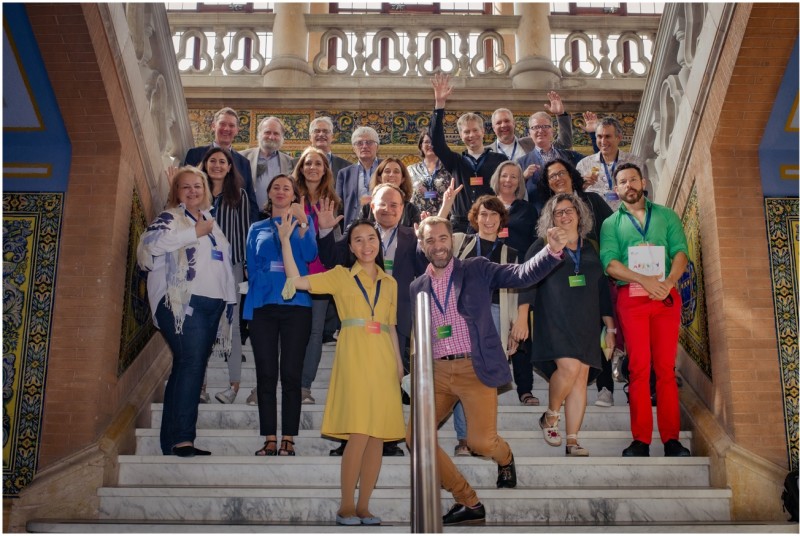The scientist who conquered Europe

When Nhien Nguyen joined Nordland Research Institute in 2017, the institute did not have a single EU project. When she now cleans her desk, the number is ten.
A research institute is used to people coming and going. Some stay for a long time, others only briefly. Not everyone manages to write themselves into the history books, but as Nhien Nguyen announces her transfer to NTNU after seven years at Nordland Research Institute (NRI), it is with the certainty that she has left a lasting mark.
– Nhien has meant an enormous amount to NRI. She showed us that it was possible for an institute like ours to get EU projects, says managing director Iselin Marstrander.
But what is it about these EU projects? Why are they so important?
Slow start
Research funds from the EU are allocated through rigorous competition, with scientific excellence being paramount. When Marstrander joined NRI in 2014, Norway was just starting to realize the importance of being competitive in this field.
– Gaining a foothold in the EU was key to enhancing our access to research funding. Getting EU projects was linked to quality and prestige, and research projects in the EU would give access to vibrant professional networks, she says.
The management team initiated several processes to enable NRI to compete for the coveted European research funds. At the same time, there was an increasing focus on EU research programs in the Norwegian Research Council, the Regional Research Fund, and in the region in general.
– In the years 2014, 2015, and 2016, we did quite a bit of application work, but the threshold was high and we couldn’t really get the hang of it, says Marstrander.
Then Nhien Nguyen appeared. A 34-year-old researcher from Vietnam who had not yet finished her PhD. She had experience from industrial enterprises, education from prestigious universities, and a set of personal qualities that made her well suited to all phases of project work.
But speaking Norwegian was not Nhien’s strongest suit. This made it natural for her to turn her gaze outward towards Europe. Remarkable events were to follow.

Lofty goals
With backing from NRI and the Norwegian Research Council, and financial support from Nordland's EU network and their guru Eivind Sommerseth, Nhien made a trip to Brussels, where the EU's headquarters are located. There she attended a so-called "brokerage event", a gathering of researchers and businesspeople who are looking for partners for their projects.
– I participated in six speed dates in one hour. One of them was with a coordinator from Austria who needed an entrepreneur on her team. I had listed NRI in the category "small or medium-sized company", so she thought we were the type of company she was looking for, says Nhien.
– When she finally understood that I was a social scientist, I had already convinced her that she needed me on the team, Nhien says with a smile.
And then – hallelujah! – NRI was a partner in its very first EU project: IAMRRI.
Back in Norway, the enterprising Vietnamese was still not completely satisfied. It was not enough just to be a partner; Nhien wanted NRI to be a coordinator, i.e. to carry the main responsibility for an EU project.
For a research institute with around 40 employees, this is a tall order. The job of coordinating an EU project in all its complexity is horribly labor-intensive and simply really, really difficult.
An inexperienced 35-year-old as the actual coordinator? Unthinkable.
But Nhien had made up her mind.

Freezing Spaniards visit Bodø
Tickets to Brussels were booked again.
– This time I was the one who was looking for partners for my project. Over 20 institutions expressed their interest. I selected enough to form a consortium, says Nhien.
The Research Council, with Kristin Eikeland at the helm, saw a potential for success. They arranged for an expert on EU projects to prepare Nhien for the coordinator role. In a few hectic months, a project application was prepared.
– The Brussels trip took place in January, in February we officially formed a consortium, in March we met for the first time in Barcelona, and in April the application was submitted, summarizes Nhien.
– The answer came in July. We got funding!
In January 2019, the project had its kick-off meeting in Bodø. Freezing Spaniards hunted for the Northern Lights in a blizzard, meat was roasted underground in a stone-age oven, and the SeeRRI project saw the light of day in the middle of the polar night. Nhien Nguyen sat in the driver's seat.
– If I had known how much work it was going to be, I would never have started, she says.

The fellowship of Nhien
The next three years were mostly about SeeRRI. Nhien received valuable help from NRI’s grand old men Åge Mariussen and Jarle Løvland. NHO Nordland, with the aforementioned Eivind Sommerseth and also Anders Paulsen, were central to the work. Liv Rask Sørensen, Dag Bastholm, and Vivian Aira from Nordland County Council also worked diligently on the project. In addition, the hard-working Dane Jens Ørding Hansen was recruited to NRI. In SeeRRI, 12 partner organizations from five countries in Europe developed a methodology that helps European regions plan in a responsible, inclusive, and sustainable way.
– The SeeRRI method emphasizes the involvement of all relevant actors and downplays political disagreements that can hinder progress, says Nhien.
– It's about doing things together, both defining the challenges and designing a strategy to overcome them.
SeeRRI was so successful that it paved the way for a sister project, DigiTeRRI. This EU project, which ran from 2020 to 2022, helped traditional industry regions make a responsible transition into the digital age.
– The knowledge from SeeRRI was used in a new setting and came in handy there as well, summarizes Nhien.
After several busy years with IAMRRI, SeeRRI, and DigiTeRRI, perhaps the time had come for a break? Of course not. The biggest project of them all was already underway.

Boasting a big budget
Through the extensive cooperation with European partners, Nhien Nguyen had cultivated a large and varied network. Somewhere along the way she had met a person who worked for Gate21, a Danish partnership with a focus on green transition. In 2018, he made contact.
– He was looking for a coordinator for a large EU project. We wanted to be part of the consortium but did not want to have the main responsibility, says Nhien.
The right partner to lead the consortium was finally found in Germany. Together with colleague Bjarne Lindeløv, Nhien travelled to Freiburg to negotiate the budget. It turned out to be big. Very big.
27 partners from six countries in Europe came together in the CityLoops project, which boasted a total budget of NOK 103 million. NRI led one of the work packages. But as the giant project came to an end in 2023, Nhien's career in Nordland was over.
– It was time to move on. I have learned a huge amount, especially since I had to learn everything from scratch. NRI was my first workplace after my doctorate. Now I want to try something else, I want to teach and guide the researchers of the future, she says.

More to come
Nhien Nguyen has played a pivotal role in NRI's EU history, but thanks to targeted and strategic efforts, several other researchers have acquired the skills required to flourish on the European stage. This has resulted in projects such as Provide, Tipping+, Prep4Blue, FACE-IT, and – not least – EmpowerUs, which NRI coordinates under the leadership of Maiken Bjørkan.
– NRI has now had many years of success in the EU, and we have an ambition that 25 per cent of our turnover should come from international sources in the future, says Iselin Marstrander.
– The institute is in a completely different position in 2024 compared to 2017 and has several talented researchers who are successful in the competition for European research funds. Recently we got funding for a new EU project called ArcSolution, and more are to come, she promises.
